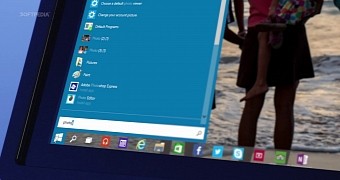Microsoft unveiled the new Windows 10 last night and it looks like it incorporates a lot of new and interesting features, but it also comes with something that was first added by Canonical in Ubuntu 12.10, online search.
We noticed a just a couple of months ago that Apple had also decided to bring online searches to its Mac OS X system by integrating them with Spotlight. This, of course, is nothing new because this particular sort of feature has been around for a couple of years in Ubuntu and it hasn't been met with the greatest enthusiasm.
Copying features from other operating systems is not something bad. In fact, it's quite commendable for Microsoft to implement something that was done by someone else already, and we hope they will also learn all other painful lessons that come with it.
Online search for the desktop is a mirage
The new operating system from Microsoft, Windows 10, seems to bring a ton of new stuff, but Microsoft's Joe Belfiore has also said a very interesting thing in the presentation video. The search field in the launcher will also access online sources, in a similar way with Windows 8.1. He doesn’t linger too much on this feature and it seems to have been mentioned only in passing. It's unclear whether this is the final form or if it will be refined.
What happens in Ubuntu with the online search is also present in the latest Mac OS X "Yosemite" Beta and it was important enough to be mentioned in Microsoft's presentation video for Windows 10.
Canonical had some problems with the online search, right after it was released, and I'm guessing the same kind of issues will appear in the other two systems. For example, with the first iterations of this feature in Ubuntu, there was no way to turn it off. That option eventually arrived, but how is that going to be handled in Windows 10? Is that feature always going to be on?
Also, it turned out that people were really interested to know what happened with their searches. The search query was going through a Canonical server, but the answer to that query returned straight to the IP. One of the online sources was Amazon, so the service knew what products the user was interested in. That issue was fixed as well, but not before the community lashed out.
How private is that online search?
The Windows community is theoretically much bigger, and in the light of recent online privacy concerns, some people might have a problem knowing that what they search online for might be stored in a server somewhere. Those searches might even be shared with a third-party company. Let's not forget that Windows 8 had product placement at some point.

 14 DAY TRIAL //
14 DAY TRIAL // 